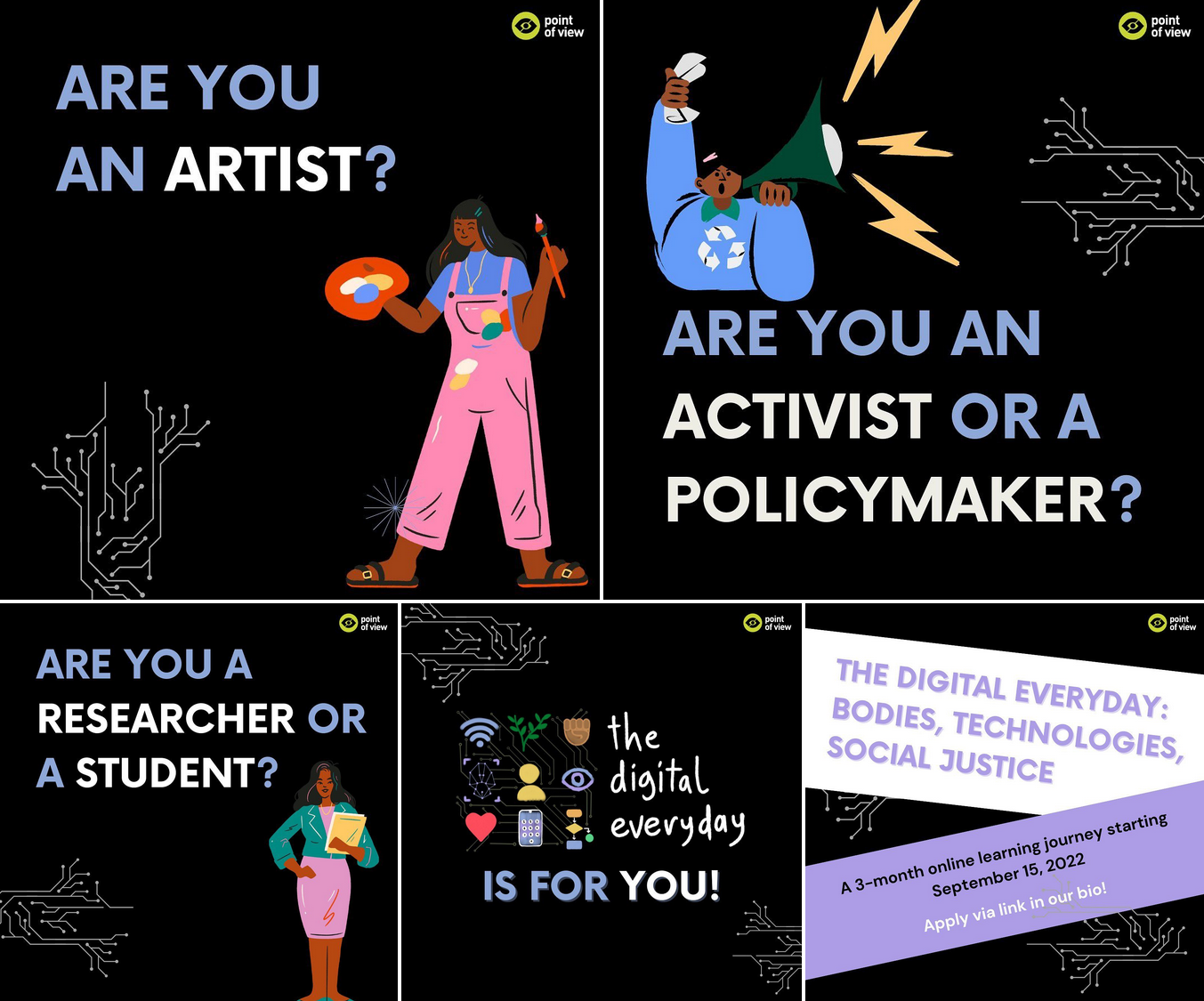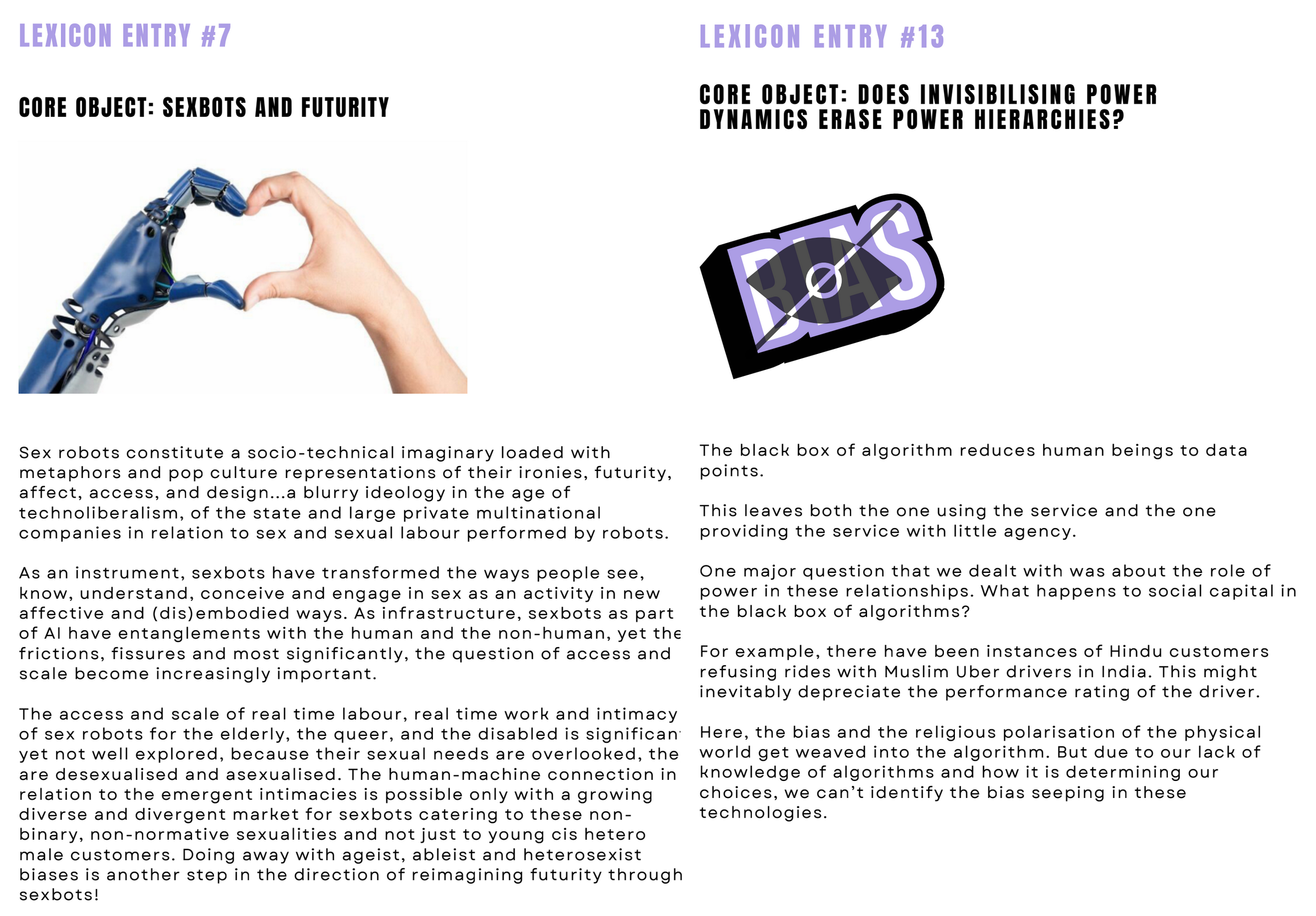
The intersection of bodies, technologies and social justice is fertile ground for planting the seeds of feminist pedagogy, as India-based APC member Point of View discovered when they developed “The Digital Everyday”, a connected learning instance (CLI) to help people understand the ways in which bodies and digital technologies interact.
With discourse around digital technologies most frequently framed by those who have the power to shape and engineer those technologies, our ability to articulate our relationships with digital spaces is often limited, or confined to questions of usage. The Digital Everyday set out to shift the focus onto agency and choice in digital technologies by empowering participants to question even their most everyday uses of technology and how they engage with it, with a view to exploring the larger questions of power, equity and justice. It was developed in alignment with Point of View’s current strategic plan “to more effectively ensure that digital rights are integrated into the thinking and understanding of various actors who contribute to social justice – local activists, researchers, academics, artists, practitioners.”
Now already on the cusp of its third edition, the first iteration of this groundbreaking educational project was conducted between September 2022 and February 2023 in collaboration with Design Beku (an India-based design collective) and ArtEZ University of the Arts (the Netherlands) with the support of an APC subgrant.
A feminist pathway for learning
While Point of View has long been working on empowering women, girls, and gender and sexual minorities in digital spaces, The Digital Everyday was an exciting opportunity to co-create a comprehensive learning journey for key actors in the region – activists, academics, designers, lawyers, journalists, essentially geared towards people working in the space of gender and using a feminist lens. “It’s been a lot of play, a lot of fun, with conversations that wouldn’t have been possible had we not created a space where people felt safe and empowered to share their lived experiences, which is where the heart of the matter really is,” said Prarthana Mitra, project anchor for The Digital Everyday.
The project offered participants two learning streams to accommodate their needs and availability – a Residents’ track with mentored learning that ran for 12 weeks, with nine cohorts totalling 90 participants meeting weekly for eight hours and working closely together around the learning modules, as well as a Learners’ track that provided a less intensive process where about 60 participants accessed the modules at their own pace.

The richest experiences happened among the Residents, who delved into 12 learning modules co-created by a diverse mix of knowledge partners and curators. “At this online residency, folks were equipped with the language to unpack the entanglements between bodies, technologies and social justice, primarily from a South Asian lens,” Mitra explained. “We tried to create thematic clusters around different modules which dealt with topics such as algorithms, surveillance, accessibility, how datafied bodies look like in justice, etc., and Residents hosted Knowledge Studios based on a cluster of their choosing!” Modules also included topics such as future technologies, representational bodies, technology imaginaries and resistant technologies, among others.
Each learning module primarily examined how bodies and technologies shape (and are in turn shaped by) everyday digital practices, using an intersectional feminist understanding of tech. “The modules have really furthered my understanding of digital spaces and some nuances of technology and have helped me critically think through digital systems through a social justice lens,” one resident said.
When asked about their experience with #TheDigitalEveryday, our Residents had a lot of insights to share! 👇
Watch this video as Urmimala unpacks her expectations, learnings and recommendations from our first edition in 2022. ⏮️#gender #data #ai #ArtificialIntelligence pic.twitter.com/AsABqR2jc1— Point of View (@povmumbai) June 30, 2023
The content was intentionally presented not as in traditional courses, but rather with freedom and flexibility for participants to explore thematic areas that most resonated with them, their work and their lived experiences. They were prepared in video format (including scripts) and included readings and questions for reflection as well as practical ways to manifest learnings in practice (called Action Labs), such as Wikipedia edit-a-thons. As one participant remarked, “This deep engagement with the reading materials and lectures where we bring in sociopolitical implications of our personal experiences, examples and questions… I appreciate it, participate in it and gain from it.”
Exploring our shifting digital everyday
As a final assignment to help map how the digital everyday is constantly being shaped, participants were tasked with developing a lexicon to synthesise their learnings. Embedding the process in co-creation, each cohort was asked to collaborate on the production of a lexicon exploring some of the concepts and processes they had learned. The lexicons were presented in the form of a core object (a meme, GIF, movie, link, platform, game, visual, etc.) that participants used to analyse how their digital everyday practices are constantly being affected by decisions and identities created online. Each object also included an annotation explaining the approach.

“Because we had a lot of multidisciplinary participants, it meant that they were bringing a lot of different objects and expressing in mediums like poetry and generative art, which made for a really kaleidoscopic, visual map at the end of the course,” commented Mitra on the diverse array of content created during this process.
Although the repository of lexicons is not currently available publicly, it continues to be accessible to the residents and learners – the alumni – to revisit and use in their respective practice. In addition, the material developed during the course continues to generate sustained impact by giving “key actors in the regions some knowledge to fall back on when they are developing their own practices and trying to look at it from a gendered lens,” Mitra said.
Based on the success of the lexicons, Point of View is considering using them in the future to develop a collection of essays on topically resonant concepts such as digital consent and algorithmic bias.
Planting the seed of change
Creating an accessible online environment for learning while responding to technical challenges, adapting to COVID restrictions and supporting participants with disabilities were major achievements throughout the process, and offered ample opportunities for learning. “For me it encapsulates and embodies the feminist collective knowledge building that we were trying to achieve with the course, creating an environment of care, collaboration, critique but also so much co-creation happening,” Mitra reflected.
In some instances, creating such spaces meant identifying challenges, determining needs and options, and adapting the course to ensure a fully inclusive approach while striving for a frictionless online experience. “Coming up with a solution in solidarity when tech has failed to create equal opportunities for all members of the cohort is the very embodiment of our feminist pedagogic principles and how we envision creating egalitarian ecosystems of learning and knowledge,” Mitra reported.
The impacts of this labour are deeply rewarding across the board, and as one participant commented in their feedback, “I have never felt more comfortable or excited while learning.”

In the second iteration of the project, Point of View opened the call for participants internationally and received applications from 30 countries. “We also have a lot of module creators who are based in different parts of the world, so other people brought in more regional perspectives into issues of, say, datafication or accessibility,” Mitra noted. “We are very proud of the diverse mix of participants as well as knowledge curators who have come in to co-create this course with us."
The Digital Everyday continues to evolve and now Point of View is preparing to host the third edition in collaboration with Design Beku and Digital Narratives Studio (the Chinese University of Hong Kong). The call for applications is open until 16 August and those who are interested in participating can learn more via Point of View’s social media.
The evolution of the project and its impact are an inspiring example of commitment and growth to building feminist ecosystems of learning and strengthening a critical movement at the nexus of gender, tech and justice. It is reflected in the learnings of participants who comprise a growing network of alumni that sustains the spirit of participatory and peer learning. As Mitra reflected, “The first pilot edition was such a great start in terms of giving us a lot of ground for playing with pedagogy, especially online pedagogy. We were able to perfect some things in the second edition, and this year we hope to continue that work. And we couldn’t have done it without that first ‘seed’.”
This piece is a version of the information provided by Point of View as part of the project “The Digital Everyday”, adapted for the Seeding Change column. This column presents the experiences of APC members and partners who were recipients of funding through APC's core subgranting programme, supported by Sida, and of subgrants offered through other APC projects.
You can read about other projects undertaken by Point of View with the support of an APC subgrant.
Did this story inspire you to plant seeds of change in your community? Share your story with us at communications@apc.org
Cover image: Logo for The Digital Everyday, Point of View.